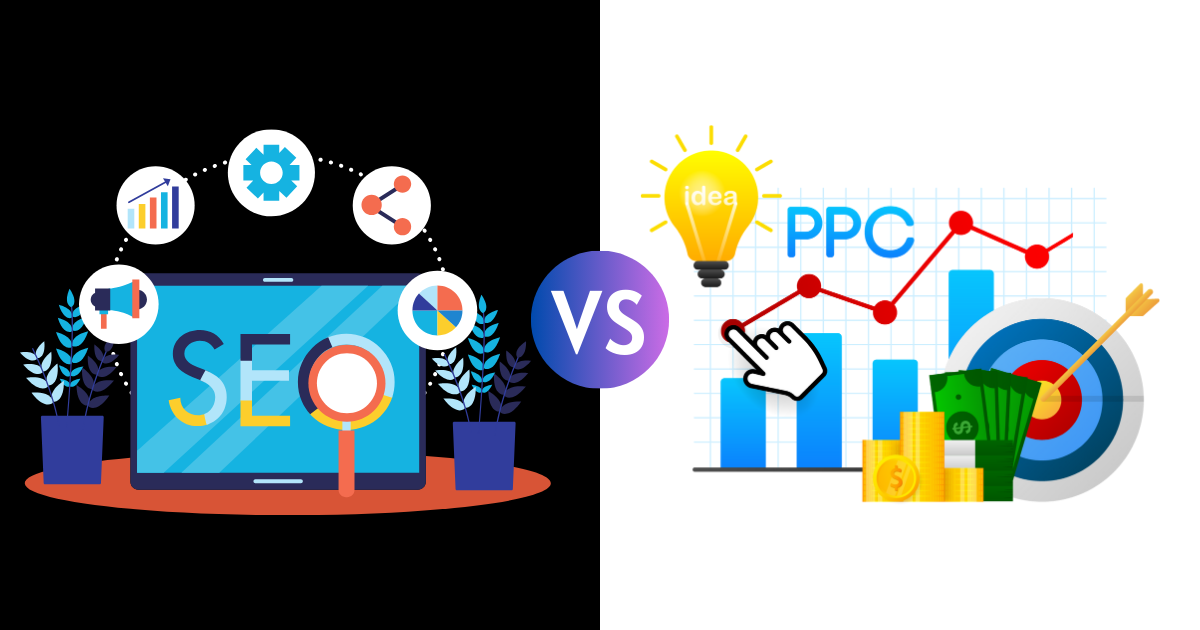Your cart is currently empty!
What is the Difference Between SEO and PPC?

Introduction to SEO and PPC
In the realm of digital marketing, SEO (Search Engine Optimization) and PPC (Pay-Per-Click) are two powerful strategies. They help businesses increase their visibility online. Understanding their differences is crucial for crafting an effective marketing strategy. Both methods aim to drive traffic to your website, but they do so in different ways. Let’s explore what sets them apart and how you can use each to your advantage.
What is SEO?
Definition and Importance
SEO stands for Search Engine Optimization. It involves optimizing your website to rank higher in search engine results. The goal is to attract organic, or unpaid, traffic. SEO is essential because most online experiences begin with a search engine. When your website appears at the top of search results, it increases your visibility and credibility. Over time, this can lead to more traffic and higher conversion rates.
Key Components of SEO
SEO consists of several key components. On-page SEO involves optimizing individual pages on your website. This includes using the right keywords, creating high-quality content, and ensuring your site is mobile-friendly. Off-page SEO focuses on activities outside your website. This includes building backlinks from other reputable sites. Technical SEO involves improving the technical aspects of your website. This includes ensuring fast loading times and a secure connection. Together, these components help improve your site’s ranking on search engines.
What is PPC?
Definition and Importance
PPC stands for Pay-Per-Click. It’s a model of internet marketing where advertisers pay a fee each time their ad is clicked. Essentially, it’s a way of buying visits to your site. PPC is important because it allows businesses to reach their target audience quickly. Unlike SEO, which can take time to show results, PPC can drive traffic almost immediately. This makes it a valuable tool for launching new products or promotions.
Key Components of PPC
PPC involves several critical components. Keyword research is crucial to identify the terms your target audience is searching for. Ad creation involves designing compelling ads that encourage clicks. Bid management is the process of setting and adjusting bids to ensure your ads appear in prime positions. Finally, landing page optimization ensures that once users click on your ad, they are directed to a page that meets their needs and encourages conversions.
Differences Between SEO and PPC
Cost Comparison
One of the primary differences between SEO and PPC is cost. SEO, while not free, involves time and effort rather than direct payments for traffic. It requires ongoing content creation, site optimization, and link-building. On the other hand, PPC involves paying for each click on your ads. This can add up quickly, especially in competitive industries. However, PPC provides immediate results, whereas SEO can take months to see significant improvements.
Traffic Generation
Another key difference is how they generate traffic. SEO focuses on earning traffic organically. This means creating valuable content and optimizing your site to attract visitors naturally. PPC, however, buys traffic by placing ads in search engine results. This ensures your website appears at the top of the page, above organic results. While SEO can provide a steady stream of traffic over time, PPC offers immediate visibility and traffic.
Long-term vs Short-term Benefits
SEO and PPC also differ in terms of their benefits over time. SEO is a long-term strategy. It takes time to build, but once established, it can provide consistent, ongoing traffic. PPC is more of a short-term solution. It can drive traffic quickly, but only as long as you continue to pay for ads. For sustained growth, a combination of both strategies is often the best approach.
Benefits of Combining SEO and PPC
Combining SEO and PPC can provide the best of both worlds. SEO can build a strong foundation of organic traffic, while PPC can provide a quick boost when needed. Together, they can improve your overall visibility and drive more traffic to your site. For example, using PPC to promote high-performing SEO content can maximize your reach. Additionally, data from PPC campaigns can provide insights to refine your SEO strategy. By leveraging both, you can achieve a more comprehensive and effective digital marketing strategy.
Conclusion
Understanding the differences between SEO and PPC is crucial for any business looking to improve its online presence. SEO focuses on organic growth through optimizing your website and creating valuable content. PPC provides immediate results through paid advertising. Each has its strengths and can complement the other. By combining both strategies, you can create a balanced and effective approach to driving traffic and achieving your business goals.
Leave a Reply